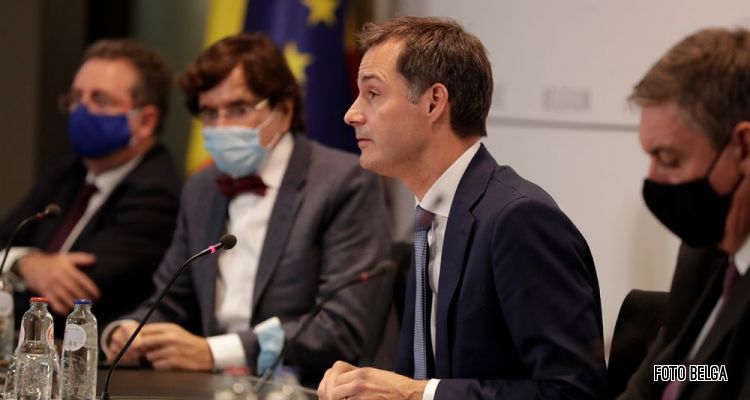Not even a week after the previous measures came into force, Belgium is taking stricter measures to stop the fourth wave in the country, announced Prime Minister Alexander De Croo during a press conference on Friday.
"This pandemic has shown once again how we always have to drive ahead while looking back," De Croo said. "Unfortunately, the much more infectious Delta variant is making our lives extremely difficult. We have never had so many infections in our country. Fortunately, we have such a high vaccination rate – otherwise things would have been much more dramatic in the hospitals."
"Yet it is clear that this situation is not sustainable. Our healthcare system is starting to crack," said De Croo, pointing to the great pressure on hospitals and GPs.
"Regular care is in danger of being compromised... we have to intervene," he said. "We are implementing a package of strict measures for a period of three weeks."
"I have said it before, but I will say it again: these measures will only be effective if we stick to them. This will require an effort from all of us. I call for the best possible implementation of the measures," said De Croo.
'A very difficult message'
Face masks remain mandatory for everyone starting from 10 years old, he stressed. "This also concerns vaccinated people."
From tomorrow, nightclubs, discos and dance halls have to close again. "It is a very difficult message," De Croo said, adding that there will also be a support package.
Organised private parties will also be prohibited.
Receiving people at home, as well as weddings and funerals will still be allowed to take place. When a professional caterer is involved, the same conditions as in the hospitality industry apply.
The hospitality sector will have to close its doors at 11:00 PM for a period of three weeks. "Those who have to close will receive support from the government."
Additionally, the maximum number of people at a table in bars or restaurants will be limited to six, unless the group are all part of a bigger household.
Sports competitions and training sessions in indoor areas can continue, but without an audience for the time being. When outdoors, an audience is still allowed
From Monday, indoor activities will only be allowed when the audience is seated. "This means that organised indoor events that are set to take place this weekend can still happen as they were planned. With all precautions, of course."
Belgium will open walk-in testing centres, where people are free to go and get tested. "Our general practitioners have to use too much of their time to test people. This way, we can lift some of their burdens."
Additionally, the booster shots will also be administered more quickly. The Interministerial Conference of Health Ministers (IMC) will come up with a plan for this tomorrow.
The Consultative Committee is asking the Regional Education Ministers to take the necessary measures in schools, concerning quarantine, testing, class trips, ventilation and CO2 meters.
Additionally, Belgium is also introducing an entry ban for travellers from southern Africa, following a call from the European Commission. Returning travellers are required to spend ten days in quarantine upon entering Belgium.
'Limit your contacts, use your brain'
De Croo highlighted some important actions that everyone can take: "Limit your contacts. We are not going to put a number on that. We are not going to decide how many people you can host at home. People should use their brains, their common sense. Importantly: meeting outside is a lot safer."
He also stressed the importance of self-tests. "They are available in pharmacies and now also in supermarkets. They are affordable and quick."
"Self-tests can ensure that activities in our home can still take place in the safest possible way. And another thing everyone can do: ventilate. It is a decisive way of ensuring that the chain of infection can be broken."
"This is a difficult moment and there is a lot of disappointment across the board. We all thought that the protection provided by the vaccine would be higher," De Croo said. "Having said that, that protection is good, but we are facing a different virus now."
Covid-21
"You could say that this is Covid-21 instead of Covid-19: it is three times more infectious than the original virus," he added. "We are trying to make sure that everyone can continue to see each other. We can still go out to bars or restaurants, there can still be activities, but it has to be done safely."
Federal Health Minister Frank Vandenbroucke stressed again that the virus is "proving to be very tough, making it very difficult for very many people."
"We had to take action and we had to make difficult choices. We are doing this because we, as a society, want to ensure good healthcare for everyone who needs it, good schools and businesses that can continue to operate," he said. "If we want to preserve that, we have to take action."
Vandenbroucke stressed that there will be support for those who are affected. "We have to take measures in all sectors. If we do not want our schools and our healthcare system to crash, we have to make those difficult decisions elsewhere."
The next Consultative Committee will be held on 15 December, when all measures will be evaluated, and more clarity about the end-of-year celebrations is expected. "We are hopeful that we can have the end-of-year celebrations with fewer measures, but that depends on our behaviour over the next three weeks," De Croo concluded.

